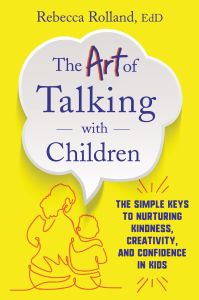Join getAbstract to access the summary!

Join getAbstract to access the summary!
Rebecca Rolland
The Art of Talking with Children
The Simple Keys to Nurturing Kindness, Creativity, and Confidence in Kids
HarperOne, 2022
What's inside?
A valuable guide to talking with children to support their social and psychological development.
Recommendation
In today’s hectic and increasingly virtual world, good conversations have become a rarity – and children are paying the price, according to speech pathologist Rebecca Rolland, as they miss out on the learnings and psychological development that quality conversations can offer. Drawing on interviews with experts including linguists and neuroscientists, Rolland shares powerful research-backed insights to help parents improve their communication with their children, support their children’s social and psychological development, and build deeper bonds with their kids.
Summary
About the Author
Rebecca Rolland is a speech pathologist and Harvard lecturer.

















Comment on this summary